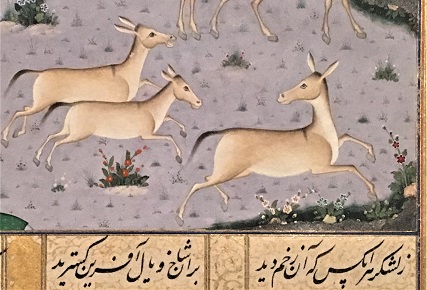I am informed by Tahir ibn Muhammad al-Ahwazi, who said:
I saw Abu Hayyan al-Muwaswas after he went from Basra to Baghdad. His only care was for the purchase of a wide-mouthed ceramic jug, which he filled with water from the Tigris and took to the canal of al-Sarat to pour it out. Then he would carry water back from al-Sarat and pour it into the Tigris. And from the time he came to Baghdad until his death, he did no other work but this. When night fell, he would set down his jug and weep over it, saying, "Dear God, lighten for me the task I am performing, and relieve me of it!"
I am also informed by Muslim ibn ‘Abd Allah, who said:
I saw Abu Hayyan al-Muwaswas when he came to Baghdad and conceived his passion for pouring water. He would carry it from one place to another to pour it out, and when asked about it, he would say, "If I don't do this every day, I'll die."
And here is one of Abu Hayyan's poems (meter: munsariḥ):
Weep no more for Hind, nor the level sands,
nor springtime pastures known by you,
but stop at Qatrabull and its amusements,
tether there your camels from the trek,
and stop in on the old man of the monastery
whom People of the Book call the Qissis.
He's not amassed a fortune. All that he owns
is his crucifix and a bell.
But he has a wineskin over his shoulder that he brings
to be my portion, carrying it spout downward.
On my first visit, I frightened him, and he quaked at me,
so I mentioned Moses. "[How about] Jesus, though!" said he,
and poured into my cup a bright, clear, unmixed stream
from a vineyard where no grubs have breached the vine.
Abu Hayyan's speech became disordered at the end of his life when he went mad. But he was not disordered in his verse. This is the way of poets who suffer dementia late in their careers: their speech becomes profoundly incoherent, but when it comes to poetry, they transcend [the confusion in] their heads, and follow the traces that were familiar to them before their madness.
From The Rankings of the Poets by Ibn al-Mu‘tazz








